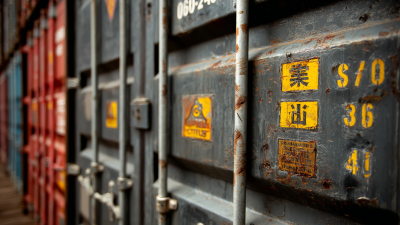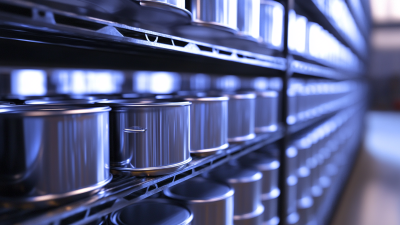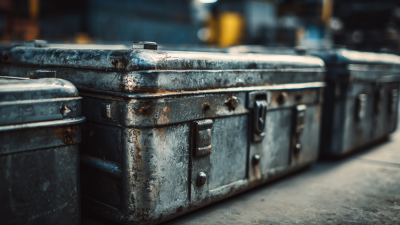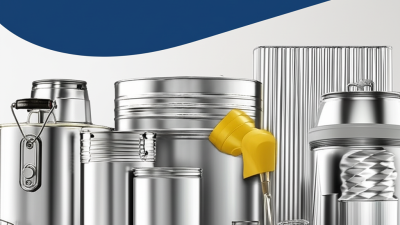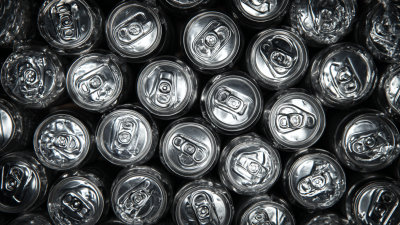 +817089618688
+817089618688
Free Standard Samples can be provided for you to check the quality.
In the ever-evolving landscape of industrial operations, selecting the right Container Metal is crucial for ensuring efficiency, durability, and compliance with safety standards. Recent industry reports indicate that approximately 60% of manufacturing processes are impacted by the choice of materials used, highlighting the importance of informed decision-making. According to a study by the International Journal of Industrial Engineering, switching to high-grade metal containers can result in a 15% increase in operational efficiency and a reduction in material waste by up to 20%. As businesses strive to optimize their supply chains while minimizing costs, understanding the specific properties of various metals—such as aluminum, stainless steel, and carbon steel—becomes essential. This blog aims to guide you through the intricacies of Container Metal selection, addressing key considerations and providing insights into how to align material choices with your unique industrial requirements.

When selecting container metals for industrial applications, several factors play a crucial role in ensuring that the chosen material meets the specific requirements of your operations. First and foremost, consider the environmental conditions the containers will face. Factors such as exposure to extreme temperatures, humidity levels, and corrosive substances can significantly impact the performance and longevity of the metal. Stainless steel, for example, is renowned for its corrosion resistance and strength, making it ideal for environments where these conditions prevail.
Another important consideration is the weight and durability of the metal. Industrial applications often require containers to withstand heavy loads and rough handling, so it’s essential to choose a material that offers ample strength without excessive weight. Aluminum, while lighter, may not provide the same level of durability as heavier alternatives like carbon steel. Additionally, think about the cost implications and the lifecycle of the container. A more expensive metal might offer a longer lifespan and reduced maintenance costs, ultimately making it a more economical choice in the long run. Evaluating these factors carefully will help you select the right container metal tailored to your industrial needs.
When selecting the right metal for industrial containers, two primary considerations dominate the decision-making process: durability and cost-effectiveness. Different metals exhibit unique characteristics that influence their suitability for various applications. For instance, stainless steel is highly regarded for its corrosion resistance, making it ideal for storing substances that can cause rust or degradation in other materials. Its strength also ensures that containers can withstand harsh environments, although this durability comes at a higher initial cost.
On the other hand, aluminum offers a lighter alternative that still maintains durability, particularly in applications where weight reduction is paramount. Its lower cost compared to stainless steel makes it a popular choice for many industries, though it may not offer the same level of resistance to environmental factors. Additionally, mild steel, when coated or galvanized, can provide a cost-effective solution where high resistance to wear and corrosion isn’t as critical. Understanding these metal types' comparative advantages allows businesses to make informed decisions balancing performance with budget constraints.
When selecting the appropriate metal for industrial containers, it’s crucial to understand the role of corrosion resistance in your choice. Corrosive environments can drastically affect the longevity and safety of your containers, making the selection of the right metal a priority. Stainless steel, for example, is renowned for its resistance to rust and other forms of corrosion, making it a popular choice in many industries. However, it’s vital to assess the specific type of corrosive agents present in your operational environment to make an informed decision.
Tips: Always conduct a thorough analysis of the chemicals that will come into contact with the metal. For environments where extreme conditions are present, consider alloys that offer superior resistance properties, such as aluminum or nickel-based metals. Additionally, always take into account maintenance practices; even the most corrosion-resistant metals require appropriate care to prolong their lifespan.
In addition to chemical exposure, temperature fluctuations can also influence metal performance. Choosing a metal that maintains its integrity under varying thermal conditions will minimize the risk of corrosion. For instance, titanium is beneficial for high-temperature applications due to its strength and resistance.

When selecting the right container metal for your industrial needs, it's crucial to assess your specific weight and strength requirements. Different metals have varying properties that can affect the performance and durability of your containers. For example, aluminum is lightweight and resistant to corrosion, making it an excellent choice for applications where weight is a concern. On the other hand, steel offers superior strength and durability, suited for heavy-duty applications, but it is significantly heavier.
Tips: Before making a decision, evaluate the load your container will need to bear. Understanding the maximum weight limit will help you choose a metal that can withstand the demands of your operation. Also, consider environmental factors such as exposure to chemicals or moisture, which can influence corrosion resistance.
Another vital consideration is the manufacturing process and design flexibility of the metal. Some metals can be easily molded and shaped into custom designs, while others may require more complex manufacturing techniques. Choosing a metal that aligns with your production capabilities can lead to cost savings and improved efficiency. By carefully assessing these factors, you can ensure that your containers meet both your weight and strength requirements effectively.

When selecting the appropriate metal for industrial containers, various environmental factors come into play that can significantly influence your decision. Corrosion resistance, for instance, is critical in environments exposed to moisture, chemicals, or extreme temperatures. Stainless steel often emerges as the leading choice due to its durability and ability to withstand harsh conditions, making it suitable for industries such as pharmaceuticals and food processing. Additionally, the weight of the metal can affect transportation and handling costs, prompting some industries to opt for lighter materials like aluminum.
Another vital consideration is sustainability. As industries increasingly prioritize eco-friendly practices, the recyclability of metals becomes a crucial factor in material selection. Aluminum, for example, is highly recyclable and can be repurposed without losing quality, appealing to companies looking to reduce their carbon footprint. Furthermore, regulatory requirements regarding packaging and material safety can drive decisions, especially in sectors like pharmaceuticals, where compliance with strict guidelines is paramount. Ultimately, understanding these environmental factors can guide industries toward making informed decisions that align with their operational needs and sustainability goals.
| Metal Type | Corrosion Resistance | Temperature Tolerance | Weight | Cost |
|---|---|---|---|---|
| Stainless Steel | Excellent | High (up to 800°C) | Medium | Expensive |
| Aluminum | Good | Medium (up to 500°C) | Light | Moderate |
| Carbon Steel | Fair (requires coating) | Medium (up to 400°C) | Heavy | Low |
| Copper | Excellent | Medium (up to 400°C) | Medium | High |
| Titanium | Outstanding | Very High (up to 1200°C) | Light | Very High |
